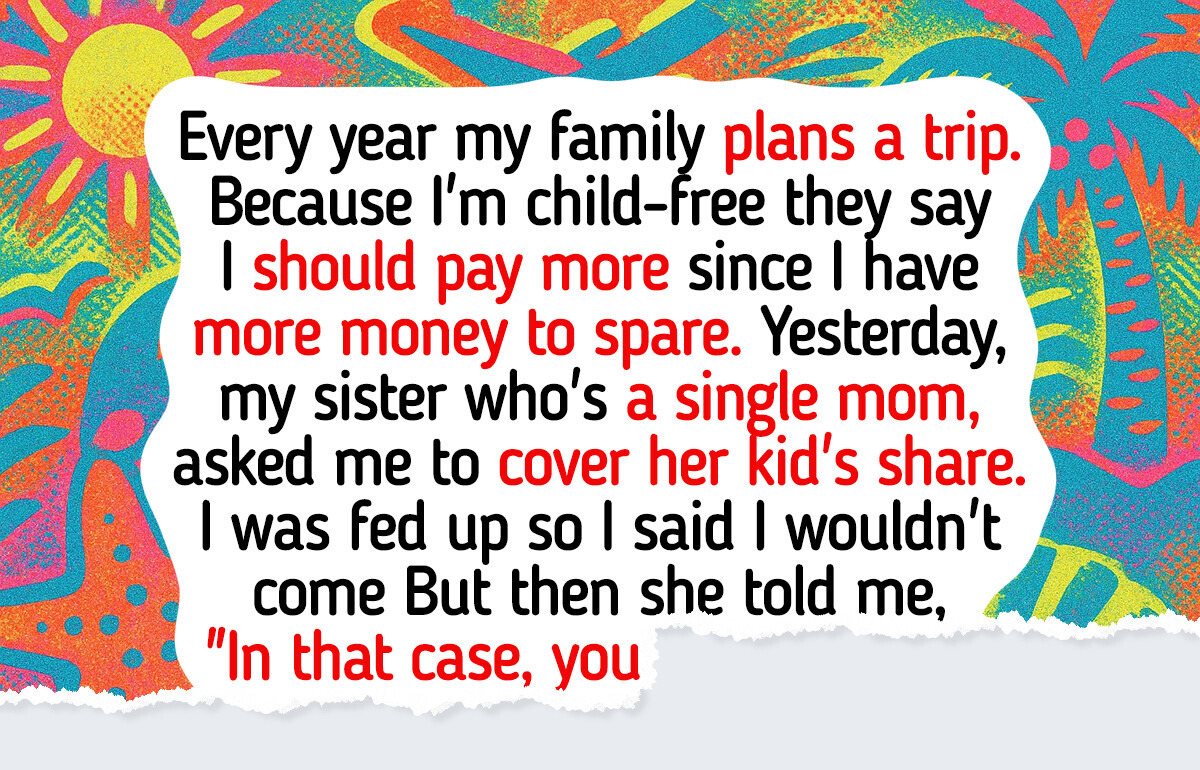No is a complete sentence.
I Refuse to Pay for Family Vacations Just Because I’m Childless

We all want to believe our family has our best interests at heart. That’s why helping them out, especially in tough times, usually feels like the right thing to do. But what happens when kindness turns into a pattern of being taken advantage of? One of our readers, Sarah (F, 34), reached out with a story that left her torn, and she wanted to know if she was wrong.
Here’s her letter:
Dear Bright Side,
Every family has its traditions. For mine, it was the annual summer trip. But behind the laughter and group photos, there was one detail no one ever talked about: I always paid more than my siblings, who came with their spouses and kids in tow.
This year, when the plans came up again, my mom called me. She explained that my sister, who’s a single mom, had just bought a new car, and finances were tight. Then, almost as if it were nothing, she added that I should just pay for my sister and her three kids to come on this trip. There was no apology, no hesitation, just the quiet assumption that, once again, I’d cover everything.
I was done being an ATM.
But I was tired. For too long, my “being single” and “earning more” had been their excuse to lean on me. So, for the first time, I told my mother: I wouldn’t be going, and they shouldn’t expect a single penny from me.
I guess my mum told my sister this because she called me later and said,
“Even if you don’t come... can you still pay for the vacation, at least for my kids?”
That’s when the backlash started.
She called me selfish, insisting everything was already booked and I should’ve warned her sooner rather than disappointing my nieces and nephews. My mother piled on, accusing me of caring more about money than family. According to her, I was failing as both an aunt and a sister.
The guilt kept piling on.
But the worst came the next day. My niece, whom I adore, called in tears. She told me I was ruining the vacation, that I had always helped before, and asked why I was suddenly refusing now. Hearing her cry broke my heart.
I’m torn about what to do.
And yet, I couldn’t ignore the truth. For years, I’ve paid without thanks, without repayment, and without anyone ever considering how unfair it was. This time, I stood my ground.
Now, my family isn’t speaking to me. The guilt is eating me alive, and a small part of me wants to give in just to keep the peace. But another part whispers: maybe, for once, I need to stop letting love be measured by how much I’m willing to pay.
Guilty and angry,
Sarah
Here’s our reply:
Dear Sarah, thank you for opening up and trusting us with your story. We truly admire the courage it took to finally stand up for yourself. We know this isn’t an easy situation, but here’s how you can handle it with confidence. We’ve outlined 5 simple steps you can use anytime someone asks you for money.
1. Appreciate the connection you share with your family.

You can cut toxic people out of your life and your whole family sounds very toxic.
To them you are nothing more than a source of money.
Instead of feeling upset when your family turns to you for help, try to thank them for trusting you. Appreciate the bond you share and the fact that they feel close enough to rely on you in difficult times. Of course, appreciating this connection doesn’t mean you’re obligated to say yes every time.
Experts often suggest treating money given to family as a gift rather than a loan. Expecting repayment can strain relationships, so it’s better to assume you won’t get it back. With that in mind, ask yourself: can you genuinely afford to part with this money, or would it take away from your own needs and savings? Your answer will guide the best decision.
2. Show understanding toward their financial struggles.

Someone else's money problems are not your problem .The advice given was extremely poor. Setting bounds with family or friends never goes over well when the first no is voiced but over time they will get use to it, if you do not set the no in stone this time you will forever be footing the bill. Sister using her child to guilt you says volumes about your sister , not you , stand your ground and keep your No a No! If your sister needs so much help then maybe your parents should foot the bill or maybe parents knowing she's a single mother shouldn't have gone for such an expensive trip and instead with something sister could afford ,maybe go for a short weekend trip thats less expensive .
I understand money problems. Everyone has them at some time. This was very poor advice. You do not have to burn yourself to keep others warm. They are aspiring to a standard of living they cannot afford without you spending more and more each year. I think it is something you will have to accept, they think of you as an ATM instead of a person. You are not losing much.
Soo, buying a new car can make her entitled to leeching to other ? Same like other post because they already done luxury vacation then they start leeching other.
That's right, YOU earn more, not them. If they can't afford it then they shouldn't plan it. Why should you be responsible for your sisters kids being able to go on a vacation? Using your niece to try and emotionally blackmail you stinks, and that little girl will continue to do it if you let her get away with it. It's a shame that your own mother treats you like that too. For your own peace of mind you really need to take a step back from ALL of them. Put yourself first for a change, like your money, YOU EARNED IT!
Entitlement at its best...Just unbelievable
Choosing not to fund your sister and her kids doesn’t mean you can’t acknowledge their situation. It’s not easy being a single mom and she may be genuinely struggling to make ends meet.
Show them compassion, but also be honest about your own financial and emotional limits. By sharing your perspective openly, you give them the chance to understand your side as well, and hopefully extend the same empathy back to you.
3. Be firm and concise when stating your decision.
If you’ve been covering the costs of family trips for years, it’s understandable that they might assume you’ll do the same again. But if this is the first time you’re setting a boundary, don’t be afraid to make it clear. Sit down with them, state your “no” directly, and keep your explanation short, just enough to show why you’re changing the pattern without overjustifying.
Most importantly, don’t let guilt drive your decision. At the end of the day, you are not responsible for funding anyone else’s vacation or their lifestyle. Your money belongs to you, and you have every right to choose how it’s spent.
4. Offer solutions that don’t involve you funding them directly.
After you’ve firmly said no to providing money, whether as a gift or a loan, consider offering alternative ways to help. Maybe you can use frequent flyer miles to reduce their airfare or some hotel vouchers to cover a night’s stay. Think creatively. This shows that while you can’t support them financially, you’re still willing to help in other meaningful ways.
5. Stick to your decision without being harsh or unkind.
Your family might come back to you for financial help, especially if they haven’t found other solutions as the trip approaches. Stay firm and remind them that you’ve changed your rules regarding money or assistance. There’s no need to justify yourself; a simple “no, I’m sorry” is enough.
Over time, they will stop expecting money from you, as long as you remain consistent in your boundaries.
These straightforward principles can help manage expectations and avoid giving money unnecessarily, not just now, but in any situation. If you’d like more tips on managing and saving money, check out this article.
Comments
Good God stop being a doormat for DIRTBALLS!!
Related Reads
15 Service Industry Stories That Prove the Job Is a Sitcom With an Unpredictable Script

I Absolutely Refuse to Delay My Retirement to Save My Spoiled Daughter and Her Son

10 True Stories With an Ending So Twisted They Deserve an Oscar

I Refused to Tip Our Waiter After He Went Too Far With My Wife

I Refuse to Sacrifice My Health to Keep My MIL Happy, I’m Her DIL, Not a Speechless Doormat

My In-Laws Forced Me to Leave My Vacation Early—They Crossed Every Line

A Server Humiliated My Wife During Our Family Lunch—I Made Sure Everyone Knew

I Passed 4 Tests for a Job, Got Ghosted by HR — They Used My Project, I Got Revenge

11 People Who Chose Kindness Over Looking Away

14 Moments Kindness Won Even When Life Was Cruel

HR Fired Me Before My Vacation — They Forgot One Thing

I Refuse to Sacrifice My Retirement Dream for My Unemployed Son







